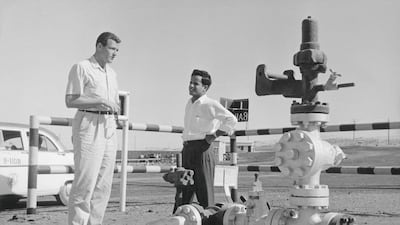Bahrain’s biggest oil and gas discovery in more than 80 years could prove a game-changer for the region’s smallest economy saddled with high levels of public debt and a widening deficit, economists said.
“It is a game-changer ... a milestone, no doubt,” said Jasim Husain, a Bahraini economist and a former member of parliament.
On Sunday the island kingdom, which lies offshore Saudi Arabia, said it discovered sizeable volumes of tight oil and gas off the west coast, which are expected to outsize current reserves.
Bahrain was the first among its GCC peers to discover fossil fuel in 1932, and was also one of the earliest to start running out of oil. Maturing reserves prompted an early diversification programme, with Bahrain developing one of the world’s biggest aluminium smelters as well as a solid regulated financial industry in the 1970s. However, the rise of competing regional hubs such as Dubai and falling output put the brakes on economic growth. The three-year slump in oil prices hit Bahrain hard, prompting downgrades from all three credit ratings agencies, which have rated the kingdom below investment grade.
A reviving hydrocarbons sector could bode well for its investment outlook, particularly at a time when Bahrain seeks to position itself as a more business-friendly hub.
“It could really improve the credit ratings in Bahrain, which is what we’re looking forward to, because now it’s currently in the negative,” said Mr Husain.
“It could change the outlook to stable and positive, but that’s yet to be seen really."
The discovery comes at a time when Bahrain’s external borrowings to GDP are inching dangerously close to 90 per cent. The economy is also heavily reliant on support from fellow members of of the GCC, mainly its bigger neighbour Saudi Arabia as well as the UAE for funds to help with infrastructure spending.
"Down the road, this discovery would translate into stronger revenues for the budget and that means really, that Bahrain would have more money to spend on infrastructure," said Mr Husain. "It would [also] be a chance for the authorities not to transfer some of the costs on to the public, because people have been asked to pay, to share some of the burden.”
___________________
Read more:
Bahrain makes biggest oil discovery since 1932
Bahrain to start tight gas development this year
___________________
He did not expect to see a postponement of 5 per cent VAT in Bahrain, which has yet to announce a timeline for its implementation.
On Monday, BMI, a Fitch subsidiary, revised estimates for Bahrain’s economic growth to 3.7 per cent and 3.4 per cent for 2018 and 2019 from the earlier 2.9 per cent, as rising oil prices lower the government’s urgency to consolidate fiscal accounts.
BMI's latest revisions are higher than those projected for the medium term by the country's own state investment agency, the Bahrain Economic Development Board. In December, the board said it forecast growth to remain at about 3 per cent in the medium term, with the economy expected to have expanded about 3.1 per cent over the previous year.
Jean-Paul Pigat, head of research at Lighthouse Research, based in the UAE, said the discovery could not have come at a better time for its economy.
“It’s going to take time to develop these resources before you start seeing an improvement on the fiscal or external position,” said Mr Pigat. But compared with other countries regionally, “Bahrain’s economy has actually been outperforming over the past year”, he added.
While Mr Husain was optimistic over Bahrain’s ability to use its as yet unexplored hydrocarbons find to secure financial commitments, Mr Pigat cautioned against more borrowings for an already debt-saddled economy.
“What matters the most in the coming months is that Bahrain secures commitments of external financial support, as that would be the true ‘game changer’,” said Mr Pigat. “For the economic backdrop, this would ideally come alongside a broader reform plan that can help with diversification efforts. More foreign borrowing is not the answer to the economy’s problems.”


